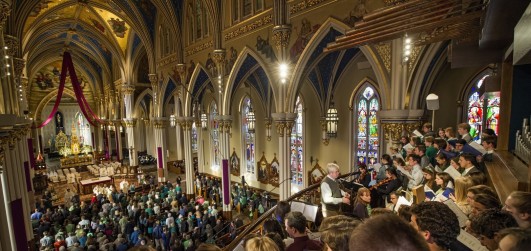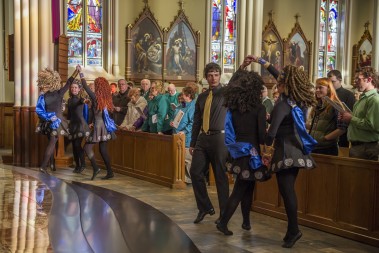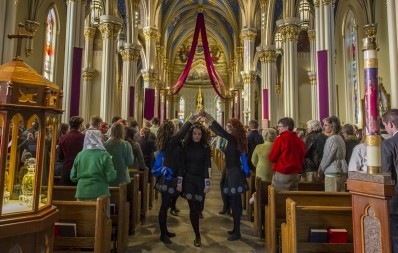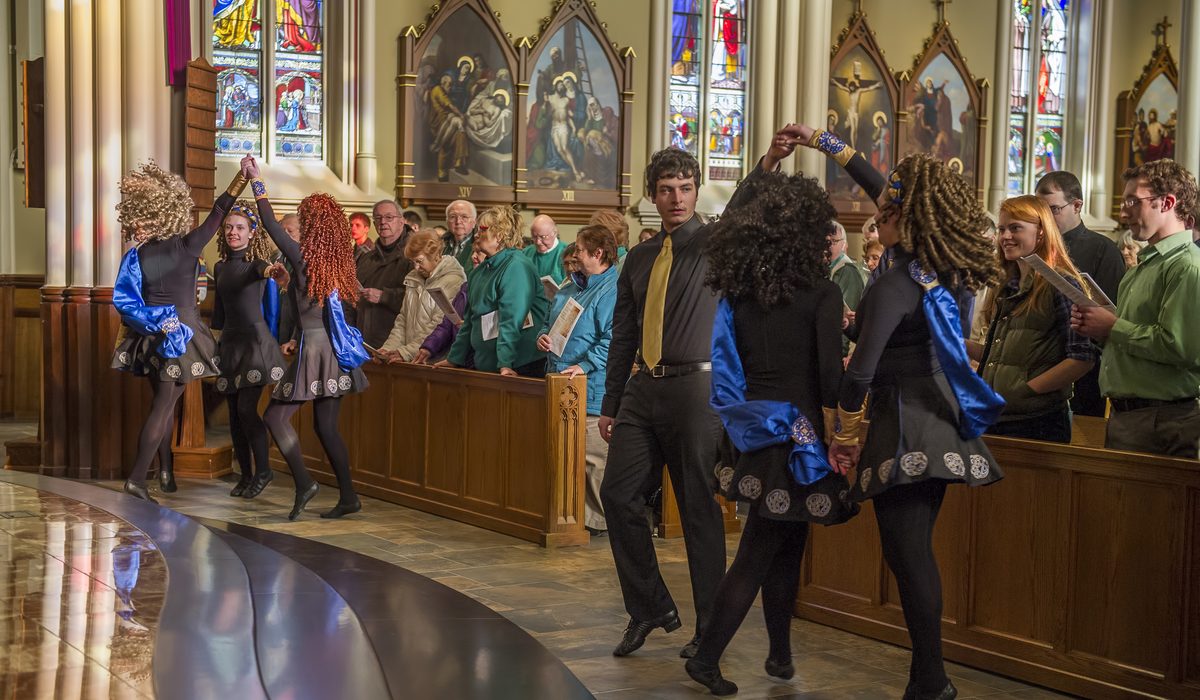March 18, 2014 // Uncategorized
St. Patrick's vocation celebrated at Notre Dame Mass

The Notre Dame Folk Choir sang at the St. Patrick’s Day Irish/English Mass held at the Basilica of the Sacred Heart on the the campus of the University of Notre Dame.
By Ann Carey
NOTRE DAME — Saint Patrick’s Day was celebrated at the University of Notre Dame at a 5:15 p.m. bi-lingual Irish/English Mass in the Basilica of the Sacred Heart with Bishop Kevin C. Rhoades as the celebrant. The Irish/English Mass is a tradition on St. Patrick’s Day when the University of Notre Dame is not on spring break during the feast, and this year’s event filled the basilica.
The Notre Dame Folk Choir sang from its Irish repertoire with instrumental accompaniment that included uilleann pipes, the national bagpipe of Ireland. The Notre Dame Irish Dancers added to the Irish flavor of the celebration by leading the entrance processional and the recessional.
 The first reading was proclaimed in Irish, and the responsorial psalm was sung in Irish. The preparation hymn was the traditional “Bless the Corners of This House,” sung in both Irish and English. Other Irish hymns during the liturgy were “Jesus, Be in Our Hearts,” and “Song of Patrick,” both sung in Irish.
The first reading was proclaimed in Irish, and the responsorial psalm was sung in Irish. The preparation hymn was the traditional “Bless the Corners of This House,” sung in both Irish and English. Other Irish hymns during the liturgy were “Jesus, Be in Our Hearts,” and “Song of Patrick,” both sung in Irish.
In his homily, Bishop Rhoades noted that Notre Dame’s history, culture and traditions have an interesting mix of French and Irish elements. Notre Dame was founded by a French priest, Holy Cross Father Edward Sorin. The bishop pointed out that within a few decades of the school’s founding, the huge Irish immigration to this country brought Irish men to the Holy Cross order and many Irish students to Notre Dame. In the 1920s, the football team became known as the “Fighting Irish,” he noted.
The bishop said that while everything Irish is celebrated in many countries on March 17, our primary focus should be St. Patrick, “the great missionary apostle of Ireland.” Patrick, like St. Peter, was called to be a fisher of men, he said, and Patrick succeeded in bringing the faith to the people of Ireland, always attributing his success to the Lord’s grace.
“In the history of evangelization, St. Patrick stands out as a great example,” Bishop Rhoades continued. “It is amazing to consider what one man did that not only converted an entire people, but also brought great fruits to the rest of Europe for centuries after, through the missionary labors of Irish monks and others.”
Bishop Rhoades added that Patrick was a model for what we now call “inculturation of the Gospel,” for he learned the Irish language and local customs to give new meaning to traditional Irish practices and customs. Even though he missed his family and the comforts of his home, Patrick felt “bound by the Spirit” to remain with the Irish people until his death, he said.
The bishop noted that the first reading of the Mass from the Prophet Isaiah described well St. Patrick’s mission of bringing the Gospel of salvation to Ireland: “How beautiful upon the mountains are the feet of him who brings glad tidings, announcing peace, bearing good news, announcing salvation.”
 Bishop Rhoades described St. Patrick as a model of a central theme of the first year of the papacy of Pope Francis: the Church’s missionary vocation.
Bishop Rhoades described St. Patrick as a model of a central theme of the first year of the papacy of Pope Francis: the Church’s missionary vocation.
“The Holy Father speaks of the Church herself as a missionary disciple and also of each of us individually called to be not just disciples of Jesus, but missionary disciples,” the bishop said. “He’s calling us to go forth as a community of missionary disciples, to be a Church that goes forth, that is not self-referential. He is calling us to live and spread the joy of the Gospel, with the desire to show people God’s infinite mercy.”
The bishop said that Francis especially calls us to go to the peripheries of society to offer everyone the life of Jesus, and “This is what St. Patrick did.”
Bishop Rhoades also referenced the pope’s address to the Notre Dame trustees and administrators when they were in Rome for a January meeting. The pope told the university’s trustees that the commitment to missionary discipleship should be reflected in a special way in Catholic universities. The bishop cited the pope’s emphasis on the need for “uncompromising witness of Catholic universities to the Church’s moral teaching and the defense of her freedom.”
He said that on the feast of the great missionary St. Patrick, it was appropriate to reflect on the pope’s challenging words to individuals and to the university.
“The apostolate of the new evangelization is an apostolate of the whole Church and all her institutions,” Bishop Rhoades said. “Thanks be to God, there are many Spirit-filled missionary disciples here at Notre Dame.”
The bishop quoted from Pope John Paul II’s 1990 apostolic constitution on Catholic universities, “Ex Corde Ecclesiae,” which calls for universities to give “living institutional witness to Christ and His message.”
In this age of secularism, he continued, Notre Dame’s institutional witness is especially needed. Likewise, he told the congregation: “We need the witness of each one of us to the joy of our own encounter with Christ, the joy of the Gospel.”
The best news. Delivered to your inbox.
Subscribe to our mailing list today.






